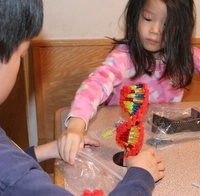February 01, 2006
On Early Retirement
I have only had one short taste of what early retirement might be like: a short three-month stint of self-imposed unemployment from Crossgain while under threat of a non-competition lawsuit by Microsoft. Some of my colleagues in the same situation had no savings and had to find work. But I had a financial cushion and decided to hang out and enjoy myself for three months.
The problem was, with all of my family and local friends and neighbors gone to work or school all day, a "life of leisure" was dreadfully lonely and boring.
So I had to find various ways to fill my time by myself. I made up projects for myself, found events to go to, things to make, things to learn. Basically I tried to invent a purpose in life. But it wasn't particularly fulfilling. Being pseudo-retired felt like being at work, except that nobody paid me and nobody cared what I did or thought; and nobody noticed if I gave up on something.
My conclusion: being retired is no fun. It is much more fun to be employed in a good place, surrounded by ambitious peers. It is fun to be needed; it is fun to try to make the world a better place; it is fun to try to accomplish something hard; and it is fun to help others try too. It is employed people, not retirees, who get to have most of this fun.
Though while I am enjoying being employed, it is still fun to read Philip Greenspun write about early retirement:
Retirement forces you to stop thinking that it is your job that holds you back. For most people the depressing truth is that they aren't that organized, disciplined, or motivated.
Read Philip's observations here.
February 03, 2006
The Idiot Principle
A recent experiment on group decisionmaking in Colorado suggests that deliberation with like-minded peers makes you more extreme:
Before deliberation, the median view, among Boulder groups, was not always so far apart from the median view among Colorado City groups. After deliberation, the division increased significantly.
Why aren't people drawn towards the median when they deliberate? Shouldn't deliberation make people moderate their views?
Apparently, the answer is "no." In deliberation, it seems, extreme viewpoints win. Assuming that enlightenment is somewhere in the middle, talking with our peers makes us dumber.
The Colorado experiment divided people into like-minded groups. Maybe the problem is in deliberating with people who are "just like us." But how do we know when our group has a bias? A left-leaning person can point to a conservative person and say "you are nuts!" But can we detect the biases in people who are just like ourselves?
Maybe the lesson is this, and it is counterintiutive: if you don't talk with people who disagree with you, you are better off not talking with anybody at all. Or, in other words:
Next time you read a book (or a blog entry) you enjoy, think about whether you are polarizing yourself. You probably are.
Each year for the past several years, orgnet's Valdis Krebs has assembled a stunning "customers who bought this book also bought" graph of Amazon data that shows a frightening polarization in the world of readers. It is a map of the current state dysfunction in U.S. politics.
I have a feeling that the "idiot principle" applies outside of politics as well...
More about group decisionmaking from the University of Chicago, here.
Bolton Brings the Gavel Down
John Bolton rings in his first meeting as Security Council president promptly, to an empty room. Everybody else in the security council, as is their habit, saunters in 15 minutes late.
Bolton wants to shake up the Security Council by doing things which seem horrific to the other UN diplomats:
- Meetings every weekday, starting on time
- Daily written briefings from Kofi Annan's staff, distributed in advance
- Open discussion rather than prepared statements
The other delgates hate Bolton's ideas, grumbling that "the ambassadors here are very busy people and it is not so easy to come each morning." Lord knows I'm no neo-conservative, but wow, bravo Bolton! If you are one of the 15 people responsible for negotiating the peace and security of the planet, you should take the task seriously. Out of bed, sleepyheads.
February 07, 2006
Lego Difference Engine
If Charles Babbage lived in 2006, would he have built his computer using LEGO?
Babbage's design could evaluate 7th order polynomials to 31 digits of accuracy. I set out to build a working Difference Engine using LEGO parts which could compute 2nd or 3rd order polynomials to 3 or 4 digits.
It's just too amazing. Bravo, Andrew Carol.
February 08, 2006
Conjuring Demons
A few days ago I wrote about how deliberations increase extremism.
Let's take a look at the Muhammad Cartoon controversy.
I want to look at thoughtful deliberation, not grandstanding, so let's pass over the thousands of opinion-leaders and bloggers spouting on about their principles of "free speech," or outrage over "blasphemy," or paternalistic calls for "tolerance."
Let's instead look at all the people who are struggling to explain the reasons behind the situation. Why do the Muslim demonstrations continue to spread? And why now, why this time? What dominoes must fall for 12 unfunny Danish cartoons to cause so much anger four months later on the other side of the planet? Smart people everywhere are trying to explain.
February 09, 2006
Lego is in our DNA
 What can you do at home on a rainy Saturday afternoon for less than $15 that captures the imagination of a a four- and seven-year old and their Dad too?
What can you do at home on a rainy Saturday afternoon for less than $15 that captures the imagination of a a four- and seven-year old and their Dad too?
The kids might suggest sitting on the couch and watching all three Harry Potter DVDs.
But one recent weekend this Dad had other plans. I had saved up a project, and we had enough free time. It was time to do some Lego microbiology.
Continue reading "Lego is in our DNA"February 12, 2006
Happy Snow Day
 Happy Sunday from Snowy Philadelphia!
Happy Sunday from Snowy Philadelphia!
Here's a photo of my poor Scion xA, not the world's best winter weather vehicle. The picture is a bit washed out because I didn't stop the camera down. But it captures the blinding whiteness of the day; the snow is falling pretty relentlessly.
Obviously, we have a day of digging out.
February 13, 2006
Evolution Sunday
From today's NYT, ministers rally to defend Darwin's theory on the day of his birthday (the 12th):
More than 10,000 ministers had signed the letter, which states, in part, that the theory of evolution is "a foundational scientific truth." To reject it, the letter continues, "is to deliberately embrace scientific ignorance and transmit such ignorance to our children."
"We believe that among God's good gifts are human minds capable of critical thought and that the failure to fully employ this gift is a rejection of the will of our Creator," the letter says.
The original petition is here. It is a thoughtful and needed counterpoint to the shrill extremism of the Dover debate.
However, the same NYT article notes that the mainstream Protestant denominations that represent most of the letter-signers have shrinking congregations. Fundamentalist and evangelical denominations - with a literal view of the Bible - are growing.
Why?
February 27, 2006
Maple Sugaring
Were you ever a Cub Scout?
Last week my son's Cub Scout pack met at Green Lane Park to witness a bit of maple sugaring. In southeast Pennsylvania, we only get perhaps a week-long maple sap run, so you need to see it at just the right time. The best part was letting the kids put their finger under a tapped maple tree to taste the dripping liquid coming straight out of the wood. The sap runs suprisingly quickly! It drips more than once a second, and you can fill a big 2-gallon bucket in maybe a day.
We are not particularly good Cub Scouts. Some of the kids in the den will be earining their "Wolf badge" in a couple weeks, but Anthony has hardly made any progress through his Cub Scout book, so he will have to wait until the end of the year to have a chance to get his. He hasn't gotten psyched up enough to do most of the projects.
But Pinewood Derby time is coming soon, and Anthony did get excited about that project. His car is done and ready to race, a month early, and he is quite proud of it. His secret Pinewood Derby tools? A pile of Lego Technic and twenty-four cents. It was a great project, and hopefully I'll have time to blog about our experience with it here soon.
More NXT Information
Will be there a remote control? Lego Education responds via email: "Currently, there are no plans to offer a remote control for the NXT brick." Too bad for my kids, who like playing with the RCX robots as (slow) RC toys. But apparently you will be able to enter a 5-step program directly into the NXT brick, which will give us another way to have fun. Maybe even more fun than RC play; we'll see!
The Lego Education blog keeps trickling information out about the NXT every few days. So far they've described the touch sensor; the servo motors (drive in a straight line!); the light sensor (you can turn off the illumnating LED!); and the sound sensor (sensitive to volume and pitch!). I want to hear about the proximity detector, which is probably the most interesting new sensor in the whole bunch.
They have also described a rechargable lithium battery system for the educational version of the NXT that promises 6x the life of ordinary nonrechargable batteries! Sounds wonderful.
Can't wait for the NXT to come out.